BRECC visits Southwest Virginia counties

Key Takeaways
If you are looking to understand the complexities and opportunities tied to our ongoing energy transition, Southwest Virginia is a good place to start. The region has been a center of coal production since the late 1800s, and it is now serving as a testbed for new ideas related to regional economic transformation. That’s why the Building Resilient Economies in Coal Communities (BRECC) Coalition, NACo’s network of 20 coal community leaders, touched down recently in Wise County and the City of Bristol, Va.
BRECC Coalition member Will Payne, managing partner of Coalfield Strategies and director of Invest SWVA, served as the group’s local host. Invest SWVA is a public-private partnership that seeks to market local assets and attract new businesses and talent to a region that encompasses 13 counties and three independent cities. While traveling to reclaimed coalfields, walking main streets and listening to local leaders, this visit generated two key lessons for leaders looking to strengthen their local economy:
First, it takes a region. Southwest Virginia sprawls across a large 13-county region that is rural and mountainous. Many places have a history of local turf wars, but local leaders are putting past disputes behind them for a shared vision to help the region recover and thrive. Counties are embracing regional partnerships, like Invest SWVA and the regional Economic Development District — the LENOWISCO Planning District Commission — to receive strategic planning and grant administration support.
One example of this includes the creation of the Lonesome Pine Regional Industrial Facilities Authority (RIFA), which enables Lee, Wise, Scott and Dickenson counties to pool their resources and share development revenues. Collaborating across county lines, the RIFA funded a regional talent attraction plan for tech and remote workers, known as Project Fuse. The authority is also backing the redevelopment of an abandoned coal loadout facility into a grain processing and distribution terminal, which will resolve supply-chain barriers and contribute to the region’s promising future in the craft beverage industry.
Second, effective diversification requires diverse strategies. Although the region backs a common vision, local partners are not all doing the same thing. Instead, they embrace multiple strategies and approaches such as small-town revitalization, energy innovation, outdoor recreation, sustainable forestry, entrepreneurship and many more.
In Wise County, a major coal-producing area, the BRECC Coalition viewed a range of innovative projects for transforming abandoned mine lands into new assets, such as alternative energy developments, industrial parks and data centers. This included the Energy DELTA (Discovery, Education, Learning & Technology Accelerator) Lab, where former mine land will become an energy testbed and proving ground for the commercialization and deployment of energy technologies, like solar, hydrogen, geothermal and small modular nuclear reactors.
While energy projects are sparking fresh excitement, localities are also focused on quality-of-life assets and building cultural tourism. In the small town of Big Stone Gap, revitalization efforts, like a vintage service station turned welcome center and a main street pharmacy turned business incubator/coworking space, are not only beautifying the town but also attracting new visitors and residents to the county. Bristol’s Birthplace of Country Music Museum, showcasing the area’s role in birthing American country music, as well as an organization called the Friends of SWVA are also nurturing a vibrant arts and culture scene.
Southwest Virginia’s progress is a beacon of hope for other coal-impacted communities, showcasing the instrumental role that creativity, collaboration and enthusiastic leadership play in economic revitalization.
Attachments
Related News

National Association of Counties Reinforces Intergovernmental Partnership in Response to State of the Union Address
The National Association of Counties (NACo) responded to President Trump’s State of the Union address with a statement from Executive Director Matthew Chase.

House Agriculture Committee chairman targets Easter farm bill passage
House Agriculture Chairman G.T. Thompson (R-Pa.): “Let’s face it — the 2018 policy was really great for 2018, but it’s no match for the challenges of 2026.”

Inland port offers opportunity for Hertford County, N.C.
Hertford County, N.C. doesn’t have a lighthouse, but that hasn’t stopped its economic future from shining thanks to what became known as Project Green Lantern.
